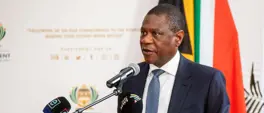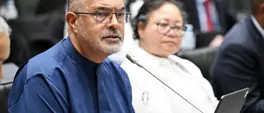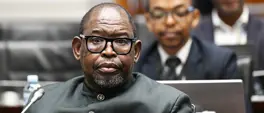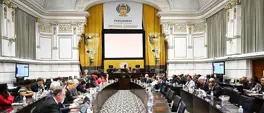JUDITH FEBRUARY | Proteas rise again despite administrative bouncers
Judith February
27 June 2025 | 10:41With the Proteas winning the ICC World Test Championship, Judith February reflects on the many obstacles the team had to navigate and overcome on the road to their success.
- Proteas
- ICC World Test Championship
- Test cricket
- T20 International
- Indian Premier League (IPL)
- Temba Bavuma
- Graeme Smith
- Cricket South Africa (CSA)

Captain of the South Africa men's Cricket Team, the Proteas, Temba Bavuma lifts the Mace as he is joined by the rest of the team upon arriving with the rest of the team at the OR Tambo International Airport in Kempton Park on 18 June 2025 after winning the International Cricket Council (ICC) World Test Championship at Lord's. Picture: Phill Magakoe/AFP
The Proteas have arrived home to an appropriately rapturous welcome after winning the World Test Championship at Lord’s.
As Kyle Verrynne and David Bedingham ended up at the crease on Day 4, Verrynne scoring the winning runs, just two Wynberg Boys’ High kids living the dream, it was hard to think of the long and arduous road that had preceded this moment of sheer joy.
For the past decade and more, South African cricket experienced "the perfect storm" with the retirement of key players between 2014-2020, inter alia, Jacques Kallis and Graeme Smith, Hashim Amla, AB de Villiers, Morne Morkel, Ashwell Prince and Vernon Philander to name a few.
It was, as with any sporting code, a sort of natural progression. Yet, continuing to grow cricket’s post-readmission roots was more complex than many like to think and was stymied, in large part by South Africa’s unique ability for self-inflicted wounds. CricketSA (CSA) found itself beset by what is now familiar in most of South Africa’s institutions: dysfunction, corruption, maladministration and self-interest.
When the Minister of Sports, Arts and Culture Nathi Mthethwa intervened in cricket at the end of October 2020 and appointed an interim board (of which I was a member), he did so as a last resort.
His intervention represented the final opportunity for Cricket South Africa (CSA) to fix governance or risk complete decline. The crisis had been brewing for a while since the Members’ Council failed to course correct and implement the recommendations of Judge Chris Nicholson in 2012 for a governance clean-up after the "Majola bonus scandal".
Then came Thabang Moroe’s tenure, first as acting CSA CEO in late 2017, and then permanently, which was nothing short of disastrous. The corruption and maladministration of this period has been well-documented in the so-called Fundudzi Report, which covered a 48-month period from 2016 to December 2019, investigating "various governance issues and allegations relating to possible failure of controls and insufficient executive oversight within CSA".
While this was happening, cricket withered on the vine, sponsors became agitated and threatened to withdraw, given the chaotic state of administration.
Internationally, South Africa’s status has been eroded both on and off the field.
Eventually, the interim board managed to put a new governance model in place. Improving the administration remains a work in progress and a new governance model, like democracy, is imperfect, but the independence rooted in it is for the greater good of the game.
Within the new board, there is cricketing knowledge but not enough, with some insipid leadership, but the corruption has been cleaned up. Some unions remain with their snouts in small troughs, but the board is working to ferret this out. The role of the SA Cricketers’ Association, representing the players and dealing with player welfare, is a crucial part of the accountability puzzle.
We are still paying the price for past wrongs. Working on broken trust between administrators, the board and players remains an ongoing challenge. Bavuma himself has been clear-eyed in his assessment of the administration of the game and has been an astute champion of his players’ needs.
It is therefore easy to see how we lost our place at the top table of the ICC, how we took our eye off the ball - in this environment, there was little space for development of the game, especially at club level.
But it is not the role of CSA alone to develop a future pipeline of young players, particularly black players.
Schools have a role to play but they can only do so if properly resourced by government. That requires money and partnerships. It also requires a focus on the importance of a holistic education, thus building a healthy society in which talent is recognised and nurtured.
So, successive ministries of Sport, Arts and Culture cannot escape accountability for the failure to see the importance of equipping schools for sport. (The incumbent minister, a dangerously clownish and unserious man, lacks the insight to do anything but sloganeer, unfortunately. Sport really does deserve better, as do the arts).
Beleaguered as the administration was and managing to lose major sponsorship (who would sponsor a corrupt sporting body intent on destroying its only asset?), enter the #SA20, with Graeme Smith as its commissioner. It is this, the proceeds of the India tour and, some may say, a weakening exchange rate helping CSA’s revenue line, which keeps cricket in SA afloat. While the slap bang of T20 cricket is not for the purists, it is a necessary "evil".
This short-form, India-led version of the game pays the bills and keeps most of the lights on. It is ubiquitous and has morphed into the Tens.
Other abominations will no doubt follow. Even Smith, as commissioner, would agree with Aiden Markram, who reiterated after his epic innings at Lord’s, that Test match cricket is the pinnacle. Nothing is like it, nothing beats it.
It is the ultimate test of concentration, skill, resilience and nerve. It’s a game beautifully languid at times, with each session telling its own story. It is also somewhat counter-cultural to the zeitgeist of immediacy.
It is a tired point, but our Future Tours Programme only has a local Test match on home soil in 18 months’ time. A travesty. So, as ICC Chair Jay Shah stood on the podium, there was no love lost. Led by India, the ICC, with Australia and England in tow, have made Test match cricket the preserve of wealthy cricket boards.
This has exacerbated South Africa’s already problem-riddled position.
But CSA now has a unique opportunity to leverage Saturday’s victory for the good of Test match cricket.
Will the administrators be able to step up to the plate with the appropriate gravitas required, garner support from other countries and stare down the behemoth which is India (and The Other Two)?
Now may well be our narrow window of opportunity.
Get the whole picture 💡
Take a look at the topic timeline for all related articles.

















